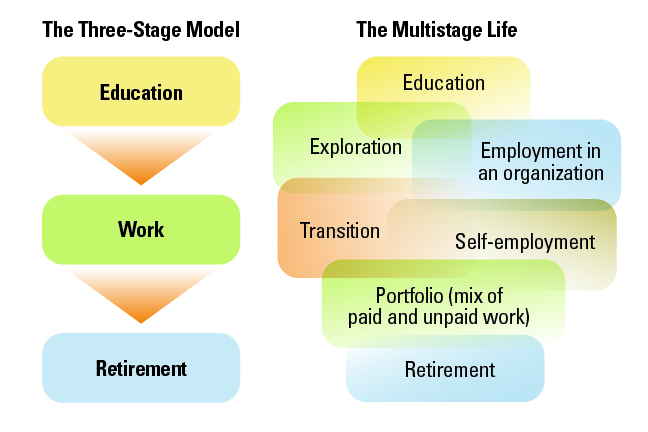Num país com esta distribuição etária:
É cada vez mais comum ouvir polícias, professores, enfermeiros, motoristas, ... dizerem que trabalhar até aos 66 anos é uma violência ... e eu, quando os oiço, penso sempre:
- Por que é que um operário tem de saltar de emprego para emprego, por causa das vicissitudes da economia, até chegar à idade da reforma e um polícia/enfermeiro/professor/... não pode terminar a carreira de polícia/enfermeiro/professor/... e mudar de profissão e fazer algo mais até chegar à idade da reforma?
Entretanto, o @walternatez enviou-me esta imagem
retirada de "The Corporate Implications of Longer Lives". O texto é também um argumento para o advento de uma economia baseada em empresas mais pequenas e mais próximas.
"People are living longer and working longer — but few organizations have come to grips with the opportunities and challenges that greater longevity brings.
...
There is growing awareness that increasing longevity will have major implications for how people manage their work lives and careers. Rising life expectancy means the level of savings required to provide a reasonable income for retirement at age 65 is becoming increasingly infeasible for most people. We predict that, given the average level of savings in advanced economies, many people currently in their mid-40s are likely to need to work into their early to mid-70s; many currently in their 20s (many of whom could live to be over 100) will be working into their late 70s, and even into their 80s.[Moi ici: Pensam que isto só acontece ou acontecerá nos outros países?. Pensem outra vez!]
Across the world, people are becoming more conscious of their lengthening working lives — but frustrated by their working context.E recuo a Janeiro de 2008 para recordar:
...
The purpose of our research was to consider the impact of longevity on individual and corporate practice.
...
Most companies, especially those operating in the advanced economies, still view life in terms of three stages: full-time education, full-time employment, and then a “hard stop” retirement around the age of 65. This is the life structure that emerged in advanced economies in the 20th century and continues to underpin much thinking about the workforce. Although this structure worked when life expectancy was 70, it cannot be stretched to support a healthy 100-year life.
...
In response to the pressures resulting from longer working lives, individuals are starting to experiment with new stages of life and creating different career structures.
...
The generation just entering the workforce has the longest expected lifespan in history, perhaps 10 to 15 years beyond that of the generation approaching retirement. In contrast to older workers, many younger workers are aware that their working lives are apt to involve many different jobs in a variety of sectors. A long and shifting career will force them to create a sense of coherence with their values and preferences, and to adapt and develop new skills and interests.
.
Members of this group are beginning to focus on options, which become more valuable as the time horizon over which they can be exercised becomes longer.
...
A primary focus during the traditional work-oriented stage of life has been financial matters: earnings, retirement savings, and home ownership. However, as life extends and careers become longer, different types of assets take on new importance.
...
The first category is productive assets: the individual’s skills, knowledge, reputation, and professional networks. It is these productive assets that will enable a 40-year-old to find interesting work during a career that spans several more decades.
.
The second category consists of what we call vitality assets, which include strong mental and physical health, a good work-life balance, and powerful regenerative relationships. Having such assets will enable people approaching the traditional retirement age to continue working.
.
The final category, which we believe will become increasingly important, is what we call transformational assets, which involve self-knowledge and the types of diverse networks that support personal change and transitions.
...
As traditional life patterns become less relevant to many people’s needs, individuals will want to pursue working lives that are more flexible and multistaged. However, this desire for flexibility will clash with current corporate practices and processes. Specifically, we anticipate three tension points, involving: (1) people’s desire for personalization; (2) their interest in flexibility; and (3) their desire not to be pigeonholed on the basis of age.
.
People want personalization; corporations want conformity.
...
People want flexibility; corporations want standardization.
...
People want to be age-agnostic; corporations want age markers.
...
Given that people are living longer, many want opportunities to contribute throughout their long working lives. Careers have many different stages, each with different aims and different needs. How people sequence the stages will be based on their own motivations, preferences, and financial requirements — not just their age.
...
In a three-stage life, the core of the employee-employer relationship was tangible assets. Corporations found that the best way to recruit and retain workers was to offer a promise of tiered earnings based on promotion and length of service, along with the prospect of a pension to finance retirement. However, for many employees, this dominant role of tangible assets has been waning in recent years.
...
As working lives become longer, the need for lifelong learning will increase. As working lives become multistaged and the sequence of those stages becomes more customized, individuals will take an interest in skills with value that extends beyond the current employer and sector. This will weaken the one-size-fits-all approach to learning and development. Instead, there will be a growing need for more decentralized and flexible approaches to learning, curated more by individuals than by employers. Skills and knowledge that are portable and externally accredited will be particularly valuable. Longevity will force a shift in responsibility for lifelong learning toward the individual."
"A formação profissional de cada um, é um assunto demasiado importante para ser delegado em regime de outsourcing a quem quer que seja."




%2006.21.jpeg)













Sem comentários:
Enviar um comentário